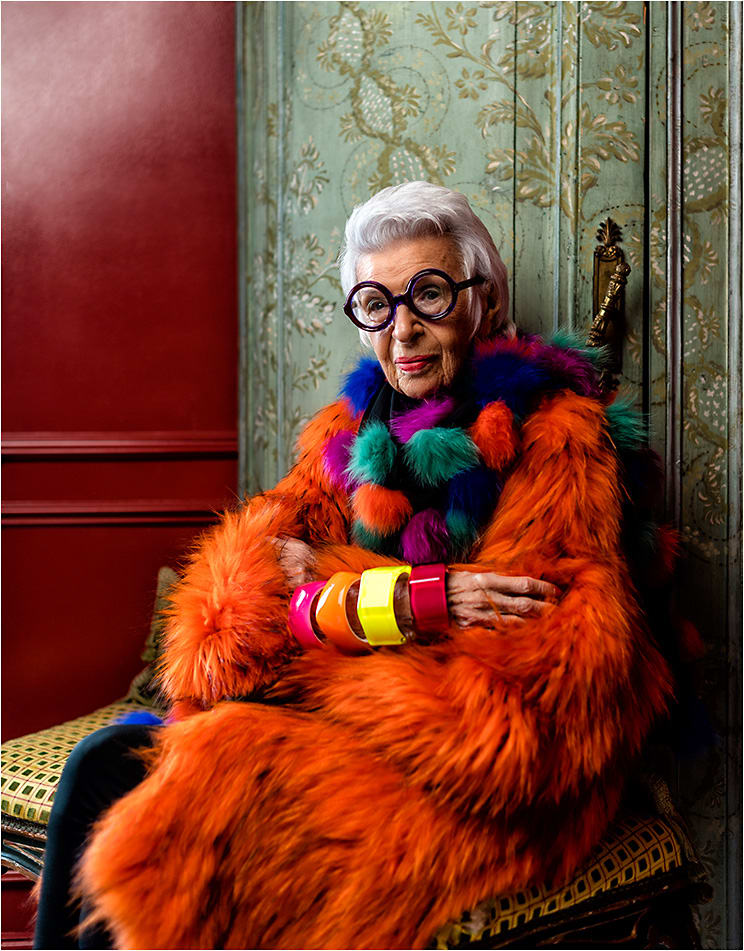Iris Apfel is busy.
At 99, she is a fashion icon, IMG model, and design luminary sought out for her keen sensibilities and eclectic style.

PHOTOGRAPHY BY NICK GARCIA. HAIR BY PHILIPPE BARR. SHOT ON LOCATION IN PALM BEACH.
And, even in the face of Covid-19, she has debuted a creativity-inducing coloring book and put forth an ethos of positivity and mask-wearing fortitude across her social channels, which have nearly 2 million fans.
“We have to think positively, [and] try our best to not sit around and moan and groan,” says Iris. “The world is a different place.”
Born in 1921 in Astoria, Queens, Iris and her late husband, Carl Apfel, launched Old World Weavers, an international fabric manufacturing company, in 1950. They went on to do work for nine White House administrations, earning Iris the nickname of “First Lady of Fabric.”
But Iris’ real fame was realized in her later years when her signature style—encompassing exuberant colors, keenly mixed prints, bold accessories, and the oversized eyewear that has become her trademark—was celebrated in an exhibit at The Costume Institute in The Metropolitan Museum of Art in 2005-2006.
Her vivacious style has also been immortalized in the compelling 2014 documentary, “Iris,” her 2018 autobiography, “Iris Apfel: Accidental Icon,” and a one-of-a-kind Barbie modeled in her likeness, glasses and all.
Here, she and Selima Salaun sit down with EB to share the details on their new eyewear collaboration.
EB: You two met while working on the Iris Apfel collection for Le Bon Marché in Paris. How did that transition into your eyewear collaboration?
IRIS APFEL: The clients of Selima’s products are sophisticated and chic, and they want something that’s a little bit different without being outrageous. We work together very well and operate on the same aesthetic. To know Selima is to love her.
SELIMA SALAUN: Iris, you have been a big inspiration for me. Last year, we decided, let’s do something more sophisticated and unique with tons of color.
EB: Tell us a bit more about the new collection.
IRIS: I thought it would be nice to incorporate some interesting, offbeat colors. Today, we need all of the help and color we can get. I think that’s a big plus for the collection.
SELIMA: Some of the colors are vintage Mazzucchelli plastics. That’s why it’s really exciting, because you won’t see them anywhere else. [View the collection at selimaoptique.com .]
EB: What drew you to eyewear as a trademark accessory?
IRIS: As a kid, I was always fascinated with spectacles. I was particularly interested when they were unusual shapes or colors.
I used to creep around to flea markets and yard sales, and whenever I saw a pair of interesting frames, I would buy them and put them away in a box. Slowly the collection grew.
I used to take them out when I was a teenager and I would occasionally wear the frames without any lenses because, even way back then, I saw that eyeglasses were a very important fashion accessory.
When I later needed [prescription] glasses, I thought, “Well, why should I get a pair of normal frames? I’ll go to my box.” I took out the biggest, roundest pair I could find. I took them to the optician, and he wanted to kill me because they were so big, they were hard to fill with bifocals.
EB: What has been your focus during the Covid crisis?
IRIS: I’m a big believer that people don’t realize they have a lot of space for creativity. I did a big project on my Instagram with closets. I told everybody, it’s a good time now, while staying at home, to get creative—go to your closet, take everything out and then make different outfits.
The idea caught fire. I got thousands of pictures from people in 70 countries. Everybody was so excited, and everyone was so interesting. I had not only the ladies, but children, men, dogs, and cats.
I think it’s a good time to reevaluate and try to become a better person. If you have a lot of mashed up lemons, you make lemonade. Learn how to live in the now—not in the past, and not in the future—because you never know what tomorrow is going to bring.




